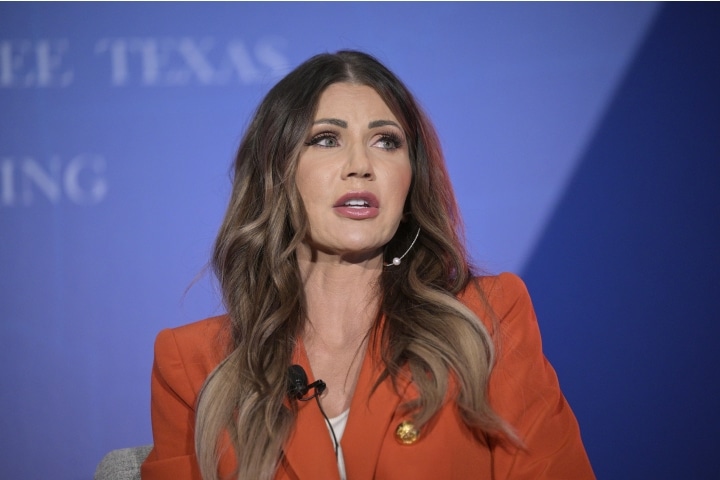
South Dakota landowners battling eminent-domain lawsuits are asking their governor, “Where are you?”
Summit Carbon Solutions is proposing a 2,100-mile carbon-capture pipeline through the Great Plains, affecting hundreds of landowners in the Mount Rushmore State, among others. Capturing this carbon from ethanol plants in the Corn Belt is supposedly going to save Mother Earth from catastrophic climate change.
Though its proposal is still under review by the South Dakota Public Utilities Commission, Summit has already filed dozens of eminent-domain lawsuits against farmers who refuse to sign voluntary easements. That means handing over control of their property to Summit, which is backed by foreign investors including China’s central bank.
Summit is also backed by pipeline dreams of the Biden administration, which is funneling billions of taxpayer dollars into carbon capture and sequestration technology to solve a climate crisis that does not exist.
Landowners are furious that, though Governor Kristi Noem campaigned on a platform in defense of private property rights, on the issue of carbon capture, she has remained aloof.
They believe her silence could have something to do with the fact that Summit was a platinum sponsor of Noem’s inaugural ball this past January, as was a large ethanol plant (where some of the carbon is captured). Several other renewable companies sponsored the event as well.
State Freedom Caucus communications director Greg Price, who has been covering the plight of the South Dakota farmers extensively, tweeted:
The pictures you see on that tweet are from the farm of Jared Bossly. Last week he had to stand by and watch as Summit surveyors invaded his property, flanked by armed sheriff’s deputies. They drilled from several locations, 90 feet down into the earth, tearing up his soybean crops in the process. He was prevented by court order from approaching within 300 feet of the surveyors, who did not have his permission to be on his property, let alone cause damage to it.
Bossly appeared on the Tamara Scott Show as events were unfolding. Here’s the description given by this shackled landowner and fourth-generation family farmer:
Today, they’ve got a semi, they’ve got a drill rig, they have four or five other pickups. They’ve got vehicles down every road coming into the ranch here. People sitting with spotting scopes around, and watching them, and watching us. And I just have to sit here and let it happen. It’s a whole lot of emotion going thru a guy. And you feel most probably helpless, and frustrated, and kind of like a failure as the protector of the homestead. And it’s just so un-American that it’s hard to believe it’s even happening here.
Today they have a tracked machine with a drill rig on. They’re drilling 90 feet down deep in. I have standing soybeans that are out of the ground and probably five inches tall, and those beans will be totally dead after all this. They’re driving across. It’s 100 degrees. The wind’s blowing 30. Those beans aren’t coming back. And I just hope like heck that they don’t start a fire in all this, too, because it’s 100 degrees and the wind’s blowing 30, and there’s a bunch of pasture stuff around that. I got cattle in there, and it’s just hard to explain the feeling.
But the pipeline family has been behind me. There’s a lot of good people behind me. We’re trying to figure out why our current officials, like say, the governor or even the judge, or any of this stuff. And it’s just a lot of things that we’re trying to figure out here.
Bossly told The New American that when he spoke with Governor Noem personally about his struggles, she told him that it’s out of her hands, and that she can’t “fight all your battles.” But Bossly is one of hundreds of her constituents going through the same ordeal at the hands of Summit. Keep in mind that they live and work in the nation’s Corn Belt. These are the farmers who feed us all.
The same people who elected Governor Noem are now accusing her of unforgivable neglect. Landowners have formed the South Dakota Property Rights group, and are demanding a special legislative session to pass a measure defending them from this misuse of eminent domain.
H.B. 1133 would have redefined carbon pipeline companies so they are not classified as “common carriers,” or commodity transporters — the logic being that if a product is disposed of deep under the earth, or if it allows a company to qualify for tax credits, that company should not be allowed to invoke eminent domain. Both conditions apply to Summit.
South Dakota Republican State Representative Karla Lems introduced H.B. 1133, and she told The New American what happened when it came up for a vote:
It passed in the House 40-28, and over in the Senate it was killed in the Senate Commerce and Energy Committee. And a similar thing happened — it wasn’t the same bill but something similar happened in the Iowa House as well. It passed in their House, and it got over to the Senate, and they didn’t even hear it.
Lems said six states are affected by the carbon pipelines proposed by Summit and another company, Navigator CO2 Ventures, which is planning a pipeline called the Heartland Greenway.
In letters emailed to The New American, the farmers are appealing to all South Dakotans to contact their state representatives and demand a special session to pass H.B. 1133. A letter sent to media outlets across the state also complains that Noem is not supporting them. It reads:
South Dakota landowners are dumbfounded, stunned and in disbelief by Governor Noem and their elected officials’ inaction and complete disregard for the recent events that happened to Jared Bossly and his family by Summit Carbon Solutions pipeline.
This pipeline company, in addition to Navigator Heartland Greenway, plans to use eminent domain against unwilling landowners to transport CO2 under high pressure (2,100 psi) and sequester it underground.
Both are private, for-profit companies with foreign ties. Neither company has been issued a permit from the Public Utilities Commission. Neither company will provide landowners with risk assessments, plume modeling or environmental impact studies.
Because of South Dakota’s inadequate eminent domain laws, the companies are allowed to survey any land that the pipeline is proposed to cross by giving a 30-day notice. Currently, over 100 South Dakota landowners have been served with eminent domain lawsuits before a PUC permit has been granted!
Noem has been consistently silent concerning landowner’s pleas!
But on Monday, Noem broke her silence when Mike Tanner of KWAT Radio asked for her specific feedback about the pipelines and constituent criticism. Here’s what she said:
Well, I’m with the landowners, and always have been. It’s — I’m a very pro-private property rights governor and have been with all the actions that I’ve taken. I’m shocked at some of those images and things that I’m seeing that’s happening to the farmers and landowners that these pipelines going on. You know, that’s not how the process is supposed to work.
Um, and I know people are asking me to take action. And we’re continuing with our legal team to look at if we have any avenues. You know, the process here is that there’s not a — the state constitution doesn’t insert the governor into this process. We’re a state of law and statutes. And there were several bills that came to the legislature this year that would have addressed this. The legislature killed them all. None of them made it to my desk. So obviously the legislature was okay with what’s happening up there. And I don’t have an avenue today that I can step in legally and constitutionally and address what’s going on, but we’re continuing to look with our lawyers to see what we can do and if there is an avenue that we could pursue. I know people at times want to just, you know, call on the governor to come in and do that.
But if you’ll remember for years and years and years, I’ve told people all along that I know specifically what my role is defined as by the Constitution, and I’m going to continue to follow our laws and statutes in the constitution. And will continue to look for ways to help these landowners.
Which, what bothers me, Mike, is that a lot of the investment that’s going into this pipeline is influenced by China. Um, you know, they have $100 million partnership here with the Chinese owned ethanol companies. Their business partner received a $300 million loan from the Chinese central bank. I tried to stop China from having an influence in South Dakota, and buying ag land, and now they’re coming out here and investing in a pipeline that’s crossing ag land. This is the last thing I want to see and I’ve been very public about it.
But the legislature didn’t support me on that bill either. And neither did ag organizations. So, you know, I would continue to encourage everybody to continue to talk to their legislators. State law needs to change if they want to stop this. And that’s something legislators haven’t been on board with yet. But I’ll continue… I’m a life-long farmer and rancher, and what Summit Carbon is doing by putting this pipeline, they are following state law. And efforts to try to change that state law didn’t get through the house or the senate last year. [Emphasis added.]
The farmers see that as a rather lackluster response from a governor who twice in the last two weeks has appeared on Capitol Hill to testify against what Western congressmen call a federal land grab. The Bureau of Land Management (BLM) has proposed a rule that would expand its power without Congressional authority by restricting most if not all access to federal lands in the name of so-called preservation. In that testimony, she was her regular fire-brand self:
This proposed rule absolutely allows them to look at large landscapes and to shut the public out of them, from accessing it, from utilizing it, from no longer being able to hunt and fish, engage in outdoor recreation, from mining, permitting, grazing, all activities. It creates a new mechanism, which I will remind you: Congress has no authority to do this. You are overstepping your authority — or that BLM has no authority to do. Congress is the only one who has the authority to put forward a rule like this to establish something like a conservation lease, which can collect fees to go out and prioritize conservation over all other activities. BLM has no authority to be able to do what they’re trying to do in this rule.
Why does she not speak in the same strong, clear language for the farmers of South Dakota?
Shop For Night Vision | See more…
Shop For Survival Gear | See more…
-
Sale!

Mesh Shooting Hunting Vest with Multi Pockets
Original price was: $59.99.$39.99Current price is: $39.99. Add to cart -
Sale!

Portable Mini Water Filter Straw Survival Water Purifier
Original price was: $29.99.$14.99Current price is: $14.99. Add to cart -
Sale!

Tactical Camo Nylon Body Armor Hunting Vest With Pouch
Original price was: $49.99.$39.99Current price is: $39.99. Select options This product has multiple variants. The options may be chosen on the product page

















































